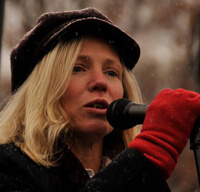We are all at risk of unjust treatment by the security state. Local police are looking more like the military, even with tanks, which has people wondering -- are the police preparing for a war? This week in Oakland, police gave surveillance footage to an employer to get an activist fired. In Hawaii, two (de)Occupy houseless protesters were sent to jail for 30 and 60 days for refusing to take down tents at an (de)Occupy Hawaii sidewalk encampment.
Protesters yell near the front door of the Sonoma County Sheriff's offices in the county center in Santa Rosa on Friday, Oct. 25, 2013.The mostly student protest group marched around Santa Rosa for justice in the death of Andy Lopez, 13. (John Burgess/The Press Democrat
There were several days of protests in Northern California against a Sonoma County sheriff who killed 13 year old Andy Lopez. In Oakland, people protested against the police Urban Shield convention. In addition,rallies were held in 30 cities against police brutality and abuse. Students at Brown University booed New York's police commissioner, Ray Kelly off the stage preventing him from speaking because of racist police practices, like stop and frisk which was in the Court of Appeals this week. The court decided to allow stop and frisk to continue pending their final decision and removed the district court judge who banned it from the case.
More people are taking up the cause of ending police abuse. And, there is also a growing movement of undocumented immigrants putting their bodies and freedom on the line to stop abusive immigration deportations.
The Revolt has Begun
For some, the revolt has started. Less than a year ago in December 2012, the Idle No More movement began, now it is a movement of thousands of people and has taken hundreds of actions. This week another coalition of First Nations announced a joint effort to deal with the threat of oil exploration in the St. Lawrence area. How much will that movement grow in a year? The Elsipogtog and Mi'kmaq have recently been in a heated struggle in New Brunswick. Some wonder whether the conflict over extreme extraction will finally break Canada's cycle of colonialism.Another area where the revolt is growing and is no longer invisible is the worker rights movement. Low wage workers at fast food outlets and Walmart have been escalating their battles. Fast food's un-liveable wages cost all of us through a massive subsidy in food stamps, Medicaid and housing. McDonalds alone cost taxpayers $1.2 billion in subsidies for their underpaid workers, while the corporation made tremendous profits.
Students are realizing that the low wage worker's struggle is everybody's struggle. This week students in California wrote a letter to University of California president, Janet Napalitano stating that they stood with low-wage workers on UC campuses. Students are also fighting back in NY against the closing of a student center. The administration responded not by listening but by suspending the protest leaders. This tone deaf response will escalate protests.
Corruption Stands in the Way of a More Positive Future
There is another side to the revolt, a vision of a world that is not ruled by money, where people and planet come before profits, where among other things a carbon-free, nuclear-free energy economy is put in place and US militarism and empire are ended.
Hedges writes:
"the real work of revolutionary ferment and consciousness is unseen by the mainstream society, noticed only after it has largely been completed. Throughout history, those who have sought radical change have always had to first discredit the ideas used to prop up ruling elites and construct alternative ideas for society, ideas often embodied in a utopian revolutionary myth. . . Once ideas shift for a large portion of a population, once the vision of a new society grips the popular imagination, the old regime is finished."
The vision became clear for students at Brown University who wanted the school to divest from coal. The students narrowed their focus to 15 companies in the school's investment portfolio that make up 1% of the school's $2.86 billion endowment. They thought the president of the university, Christina Paxson, a former public health researcher would be with them. Students asked the five members on the board of trustees who had a conflict of interest with coal to recuse themselves. They didn't and once that decision was made, the students knew they would lose.Corruption runs deep in the United States.The system is rotten and Hedges points out that many in the system know it. No doubt the Brown University president knows recusal should have occurred and Brown should divest from coal. Hedges points to smart politicians like President Obama and former President Clinton. He writes:
(Note: You can view every article as one long page if you sign up as an Advocate Member, or higher).










